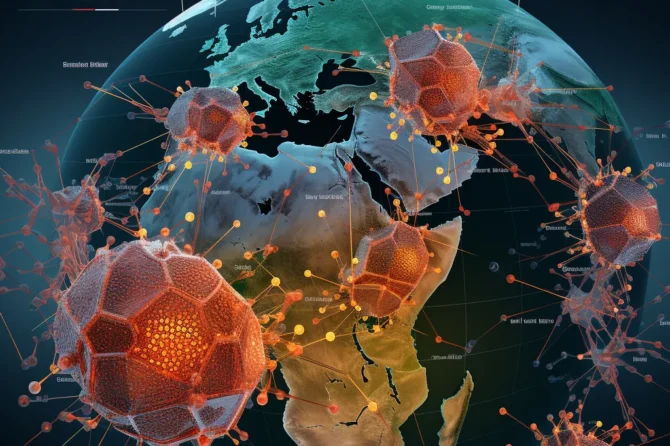Introduction:
In a monumental recognition of scientific brilliance, the illustrious scientist David J. Lipman has been bestowed with the esteemed 2023 Warren Alpert Foundation Prize. This distinguished accolade celebrates his groundbreaking contributions to the realm of computational biology and biomedical research, marking a watershed moment in the annals of scientific achievements.
Lipman’s journey of visionary exploration, deeply rooted in the realm of computational biology, has centered around the design and implementation of computational tools, databases, and infrastructure that transcend conventional boundaries. His innovative work has engendered a transformative shift in the analysis and accessibility of biomolecular information, yielding a profound impact on researchers and professionals around the globe.
As a luminary in his field, Lipman’s pioneering endeavors have traversed uncharted territories, where computational insights and tangible discoveries in the realm of biology converge. His indomitable spirit and relentless pursuit of knowledge have propelled the evolution of scientific paradigms, catalyzing crucial discoveries and forging unprecedented collaborations in diverse arenas of biomedicine.
It is within this context that the 2023 Warren Alpert Foundation Prize assumes its significance. The magnitude of Lipman’s contributions to the field of computational biology has not merely redefined the contours of scientific progress but has also democratized the flow of scientific information. This democratization, in turn, has been a driving force behind the emergence of new horizons in research and the unraveling of enigmatic biological complexities.
The resonance of Lipman’s accomplishments in the realm of computational biology echoes far beyond the confines of laboratories and institutions. His remarkable contributions have transcended geographical and disciplinary boundaries, sparking an unquenchable thirst for knowledge and innovation in the ever-evolving field of computational biology. The ripple effect of his work extends to fields as diverse as genomics, drug discovery, and personalized medicine, illuminating pathways that were previously shrouded in obscurity.

As the custodian of a half-million-dollar prize, the Warren Alpert Foundation Prize, administered by the esteemed Harvard Medical School, acknowledges individuals whose endeavors in the realm of computational biology have ushered in a new era of understanding, prevention, treatment, or even the cure of human diseases. David J. Lipman’s name is etched among the select few who have forever altered the course of science and medicine, blazing trails that will be followed for generations to come.
In this grand tapestry of scientific exploration, David J. Lipman, a true visionary in the realm of computational biology, emerges as a trailblazer, a visionary, and an exemplar of the boundless potential that resides within the realm of human inquiry. The echoes of his work resound in laboratories, research institutions, and healthcare facilities, affirming the power of knowledge, collaboration, and innovation in shaping the destiny of humanity’s battle against disease.
Computational Biology:
David J. Lipman’s influential career commenced in the vibrant era of the 1980s and 1990s, a time when the convergence of technology and biology was poised to revolutionize the scientific landscape. It was during this epoch that Lipman’s incisive mind conceived and harnessed computational tools that would forever alter the trajectory of biomolecular analysis. DNA, RNA, and proteins—the intricate building blocks of life—were about to yield their secrets in ways previously unfathomed.
In his capacity as the founding director of the esteemed National Center for Biotechnology Information (NCBI), Lipman masterminded the inception of computational tools that would be nothing short of revolutionary in the realm of computational biology. Among his most celebrated achievements is the conceptualization and development of the Bioinformatics Basic Local Alignment Search Tool (BLAST). A computational marvel, BLAST has endowed researchers with the power to compare newly unraveled sequences against an expansive compendium of known sequences, unfurling insights that propel the realms of computational biology and molecular biology into uncharted territories.
The far-reaching impact of BLAST, often referred to as the life sciences’ magnifying glass, transcends mere technological innovation within the field of computational biology. It permeates laboratories, clinics, and research hubs, illuminating pathways that lead to the heart of biological understanding. It’s no hyperbole to assert that BLAST, guided by Lipman’s visionary acumen, has scripted a narrative of discovery that echoes across disciplines, enabling scientists to decipher the enigma of life’s intricate coding.
Yet, BLAST is but one testament to Lipman’s indelible mark on the scientific landscape, particularly in the realm of computational biology. His pivotal role in the conceptualization and implementation of PubMed, the digital repository of biomedical literature, stands as a testament to his commitment to making knowledge universally accessible in the field of computational biology. This web-based repository, nestled within the embrace of NCBI, has redefined the access to scientific research within computational biology. What was once a labyrinth of tomes and journals has metamorphosed into a virtual haven where scientists, physicians, students, and the curious public converge to glean knowledge, fostering cross-pollination of ideas and catalyzing innovation within the realm of computational biology.
Beyond the realm of technology, Lipman’s contributions span the delicate tapestry of biology’s inner workings, intricately interwoven with the tenets of computational biology. His pioneering work in the domain of comparative sequence analysis and the evolution of the BLAST algorithm has unveiled the hidden threads that weave the fabric of genes and proteins within the context of computational biology. In the mosaic of evolutionary relationships, Lipman’s insights have illuminated pathways that traverse gene function within the scope of computational biology, offering vital breadcrumbs that have led to breakthroughs in domains as diverse as cancer biology and the identification of sources for foodborne outbreaks, all within the realm of computational biology.
Yet, perhaps the most enduring legacy of Lipman’s oeuvre within computational biology lies in the shift he spearheaded towards open-access science. His advocacy for the democratization of scientific information and the removal of barriers that stifled collaboration has ushered in an era of boundless possibility within the realm of computational biology. By fostering a community of shared knowledge within computational biology, Lipman has paved the way for scientists to transcend geographical divides, lending wings to research that knows no borders, especially within the realm of computational biology.
David J. Lipman stands as a visionary figure, an architect of transformational change in the scientific universe within the realm of computational biology. His contributions have not only facilitated singular discoveries but have redefined the very fabric of scientific inquiry within the field of computational biology. His legacy resonates in laboratories, research institutions, and hospitals, propelling science forward and inviting us all to view the universe through the lens of possibility within the realm of computational biology. As his name is etched onto the annals of scientific history within the realm of computational biology, it carries the weight of a legacy that continues to shape the present and illuminate the future within the realm of computational biology.
Conclusion:
In the realm of scientific excellence, few names resonate as profoundly as that of David J. Lipman. The 2023 Warren Alpert Foundation Prize has bestowed upon him a recognition that goes beyond mere accolades—it’s a celebration of the visionary work he has championed in the arena of computational biology. His journey has been one of relentless innovation, a journey that has redefined the contours of scientific exploration and bestowed upon us a treasure trove of knowledge that will reverberate for generations.
Lipman’s foray into computational biology stands as a testament to the power of human imagination and intellect. His pioneering efforts have shattered the confines of traditional analysis, opening new windows to the intricate dance of biomolecular sequences. The landscape of biology, medicine, and beyond has been irrevocably transformed through his endeavors, offering researchers and professionals a panoramic view into the microscopic realms that underpin life itself.
At the heart of Lipman’s legacy lies the groundbreaking BLAST program—a manifestation of his brilliance and innovation. This computational marvel has harnessed the power of algorithms to traverse the vast sea of biological data, connecting dots that were previously scattered in the abyss. BLAST has become more than a tool; it’s a beacon guiding scientists toward hidden insights, powering discoveries that range from understanding genetic origins to illuminating pathways of disease progression.
But Lipman’s influence goes beyond algorithms and databases; it transcends the digital realm to touch the very core of scientific collaboration. His brainchild, the PubMed database, has democratized access to biomedical literature, ushering in an era where knowledge is no longer a privilege but a birthright of humanity. The echo of his work reverberates in laboratories, clinics, and libraries, where researchers and learners converge to seek answers, kindling the fires of discovery and sparking collaborations that span continents.
Lipman’s monumental achievements resonate deeply with the mission of the Warren Alpert Foundation Prize. His commitment to advancing open-access science and democratizing knowledge aligns harmoniously with the foundation’s vision of recognizing individuals who have significantly advanced the understanding, prevention, treatment, or cure of human diseases. Through his tireless efforts, Lipman has woven a tapestry of scientific progress that touches lives, embodies hope, and propels us closer to conquering the mysteries of health and disease.
As he stands among the illustrious ranks of past prize recipients, Lipman’s name is etched onto the pages of scientific history—a name that conjures visions of innovation, transformation, and impact. This recognition serves not only as a testament to his remarkable achievements but also as an inspiration for the next generation of scientists to dream big, explore uncharted territories, and push the boundaries of human knowledge.
In receiving the 2023 Warren Alpert Foundation Prize, David J. Lipman steps into a realm of distinction, where his legacy becomes an integral part of the tapestry of scientific advancement. With gratitude, admiration, and a shared sense of purpose, the scientific community salutes his exceptional contributions and envisions a future where his legacy continues to illuminate the path toward deeper understanding, breakthrough discoveries, and a healthier world for all.
If you need more information on this article click on the following link. This link will provide more extensive information and elaborate on the topic.
Genomic.News is your ultimate source for curated news, articles, and updates on the fascinating world of genomics. Our platform brings together the latest scientific breakthroughs, research advancements, and industry developments in one centralized hub. Stay informed about the cutting-edge discoveries, transformative technologies, and ethical considerations driving the field of genomics. Explore the intersection of genetics and healthcare, agriculture, biotechnology, and beyond.





